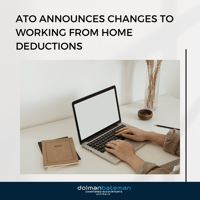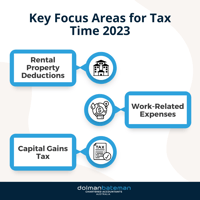The COVID-19 pandemic has caused a major shift in the way people work, with many now working from...
Tax Planning Part 4: Tax Implications of Working from Home
.png?width=1080&height=1080&name=Graphics%20-%20DB%20Socials%20and%20Blogs%20(9).png)
With the rise of remote work since COVID-19, understanding the tax implications and available deductions for home office expenses has become crucial for many Australians.
Here’s how you can ensure you're maximising your tax benefits while working from the comforts of your home.
Understanding the Fixed Rate Deduction
For employees who work from home, the Australian Taxation Office (ATO) offers a fixed rate deduction of 67 cents per hour to cover expenses such as electricity, internet, phone, and stationery.
This method simplifies the deduction process as it does not require detailed expense tracking, making it a convenient option for many.
However, it's important to note that this rate only covers certain expenses, and you cannot claim additional costs covered by this rate under any other deduction method.
Claiming Actual Costs
If you prefer a more tailored approach, you can opt for claiming actual costs.
This method involves keeping detailed records of all home office expenses, including receipts and a diary of hours worked. You can claim a proportion of running expenses based on the actual costs incurred.
This might include more significant expenses like office furniture and computer equipment, which can also be depreciated over time.
Eligibility for Deductions
To be eligible for home office deductions, you must have a dedicated work area that is not used for personal activities during the time you claim.
This does not mean that the space has to be a separate room, but it should be a clearly defined area of your home.
Additional Deductible Expenses
Beyond the typical expenses, other costs might be deductible depending on your circumstances.
For example, if you're required to use your own phone or internet for work purposes, you may be able to claim a portion of these bills.
Similarly, the cost of cleaning your home office can be deductible, but you need to keep evidence if you are using this part of your home for work regularly and exclusively.
Special Considerations for Independent Contractors
If you are an independent contractor or a sole trader, the rules can differ.
You may be eligible to claim occupancy expenses like rent, mortgage interest, insurance, and council rates, in addition to running expenses.
These are generally more comprehensive and can lead to greater deductions, but they require strict proof of home office use and can complicate matters like capital gains tax when you sell your home.
Stay Informed and Compliant
With tax regulations frequently changing, especially in response to the increasing trend of remote work, staying updated on the latest ATO guidelines is crucial.
Using the fixed rate method simplifies record-keeping but may not capture significant expenses that could be claimed.
Therefore, it might be beneficial to consult with a tax professional to determine the most advantageous and compliant way to claim home office deductions.




